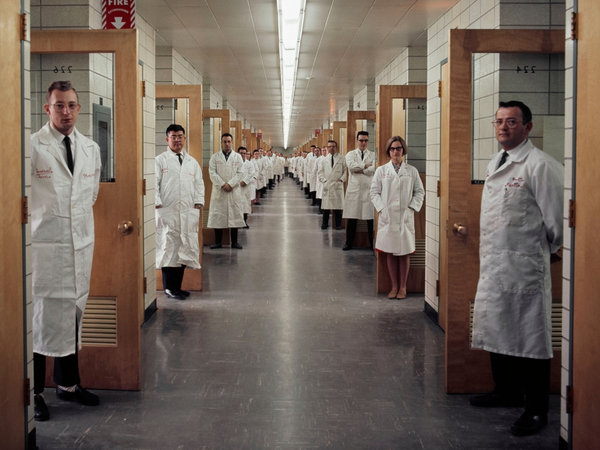 Jon Gertner, "True Innovation", NYT 2/25/2012
Jon Gertner, "True Innovation", NYT 2/25/2012
At Bell Labs, the man most responsible for the culture of creativity was Mervin Kelly. […] In 1950, he traveled around Europe, delivering a presentation that explained to audiences how his laboratory worked.
His fundamental belief was that an “institute of creative technology” like his own needed a “critical mass” of talented people to foster a busy exchange of ideas. But innovation required much more than that. Mr. Kelly was convinced that physical proximity was everything; phone calls alone wouldn’t do. Quite intentionally, Bell Labs housed thinkers and doers under one roof. Purposefully mixed together on the transistor project were physicists, metallurgists and electrical engineers; side by side were specialists in theory, experimentation and manufacturing. Like an able concert hall conductor, he sought a harmony, and sometimes a tension, between scientific disciplines; between researchers and developers; and between soloists and groups.
One element of his approach was architectural. He personally helped design a building in Murray Hill, N.J., opened in 1941, where everyone would interact with one another. Some of the hallways in the building were designed to be so long that to look down their length was to see the end disappear at a vanishing point. Traveling the hall’s length without encountering a number of acquaintances, problems, diversions and ideas was almost impossible. A physicist on his way to lunch in the cafeteria was like a magnet rolling past iron filings.
I started work at Murray Hill in 1975, nine years after someone staged that picture of white lab coats extending to the vanishing point. And even though my first office was in an unused chemistry lab, I don't recall ever seeing more than an occasional pragmatic lab coat — whoever staged the photograph was apparently using the same lab-coat=scientist iconography as a couple of generations of cartoonists and movie-makers. But I can certainly attest to the value of hallway and lunchroom serendipity.
These days, some of the same serendipitous conversational cross-fertilization comes from random encounters in the corridors and cafeterias of the internet.
Read the rest of this entry »


